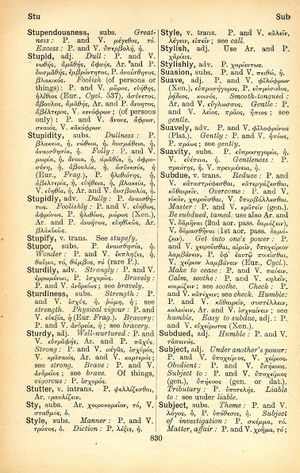subject: Difference between revisions
Οὐπώποτ' ἐζήλωσα πολυτελῆ νεκρόν → Numquam probarim sumptuosum mortuum → Nie preis ich einen Toten selbst im Prachtgewand
(CSV5) |
m (Woodhouse1 replacement) |
||
| Line 1: | Line 1: | ||
{{Woodhouse1 | {{Woodhouse1 | ||
|Text=[[File:woodhouse_830.jpg|thumb|link={{filepath:woodhouse_830.jpg}}]] | |Text=[[File:woodhouse_830.jpg|thumb|link={{filepath:woodhouse_830.jpg}}]] | ||
===adjective=== | |||
[[under another's power]]: [[prose|P.]] and [[verse|V.]] [[ὑποχείριος]], [[verse|V.]] [[χείριος]]. | |||
[[obedient]]: [[prose|P.]] and [[verse|V.]] [[ὑπήκοος]]. | |||
[[subject to]]: [[prose|P.]] and [[verse|V.]] [[ὑποχείριος]] (gen.), [[ὑπήκοος]] (gen. or dat.). | |||
[[tributary]]: [[prose|P.]] [[ὑποτελής]]. | |||
[[liable to]]: see under [[liable]]. | |||
===substantive=== | |||
[[theme]]: [[prose|P.]] and [[verse|V.]] [[λόγος]], ὁ, [[prose|P.]] [[ὑπόθεσις]], ἡ. | |||
[[subject of investigation]]: [[prose|P.]] [[σκέμμα]], τό. | |||
[[matter]], [[affair]]: [[prose|P.]] and [[verse|V.]] [[χρῆμα]], τό; see [[matter]]. | |||
[[as opposed to predicate]]: [[τὸ ὑποκείμενον]] (Aristotle). | |||
[[providing posterity with subjects for song]]: [[verse|V.]] [[ἀοιδὰς δόντες ὑστέροις βροτῶν]] ([[Euripides|Eur.]], ''[[Troades]]'' 1245, cf. [[Euripides|Eur.]], ''[[Supplices]]'' 1225). | |||
[[be a subject of dispute]], v.; [[prose|P.]] [[ἀμφισβητεῖσθαι]]. | |||
[[nothing to do with the subject]]: [[prose|P.]] [[οὐδὲν πρὸς λόγον]], [[ἔξω τοῦ πράγματος]]. | |||
[[subject to your approval]]: [[prose|P.]] and [[verse|V.]] [[εἰ σοὶ δοκεῖ]]. | |||
[[subjects]], [[those governed]]: [[prose|P.]] and [[verse|V.]] [[οἱ ὑπήκοοι]], [[prose|P.]] [[οἱ ἀρχόμενοι]]. | |||
[[be subjects]], v.: [[prose|P.]] and [[verse|V.]] [[ἄρχεσθαι]]. | |||
[[be subjects of]]: [[Aristophanes|Ar.]] and [[prose|P.]] [[ὑπακούειν]] (absol. or with dat. or gen.). | |||
===verb transitive=== | |||
[[bring into subjection]]: [[prose|P.]] and [[verse|V.]] [[καταστρέφεσθαι]], [[κατεργάζεσθαι]]; see [[reduce]], [[enslave]]. | |||
[[expose]]: [[prose|P.]] and [[verse|V.]] [[ὑποβάλλειν]] ([[τινά τινι]]); see [[expose]]. | |||
[[be subjected to malicious accusations]]: use [[Aristophanes|Ar.]] and [[prose|P.]] [[συκοφαντεῖσθαι]]. | |||
}} | }} | ||
Revision as of 08:49, 20 May 2020
English > Greek (Woodhouse)
adjective
under another's power: P. and V. ὑποχείριος, V. χείριος.
subject to: P. and V. ὑποχείριος (gen.), ὑπήκοος (gen. or dat.).
substantive
theme: P. and V. λόγος, ὁ, P. ὑπόθεσις, ἡ.
subject of investigation: P. σκέμμα, τό.
matter, affair: P. and V. χρῆμα, τό; see matter.
as opposed to predicate: τὸ ὑποκείμενον (Aristotle).
providing posterity with subjects for song: V. ἀοιδὰς δόντες ὑστέροις βροτῶν (Eur., Troades 1245, cf. Eur., Supplices 1225).
be a subject of dispute, v.; P. ἀμφισβητεῖσθαι.
nothing to do with the subject: P. οὐδὲν πρὸς λόγον, ἔξω τοῦ πράγματος.
subject to your approval: P. and V. εἰ σοὶ δοκεῖ.
subjects, those governed: P. and V. οἱ ὑπήκοοι, P. οἱ ἀρχόμενοι.
be subjects, v.: P. and V. ἄρχεσθαι.
be subjects of: Ar. and P. ὑπακούειν (absol. or with dat. or gen.).
verb transitive
bring into subjection: P. and V. καταστρέφεσθαι, κατεργάζεσθαι; see reduce, enslave.
expose: P. and V. ὑποβάλλειν (τινά τινι); see expose.
be subjected to malicious accusations: use Ar. and P. συκοφαντεῖσθαι.

